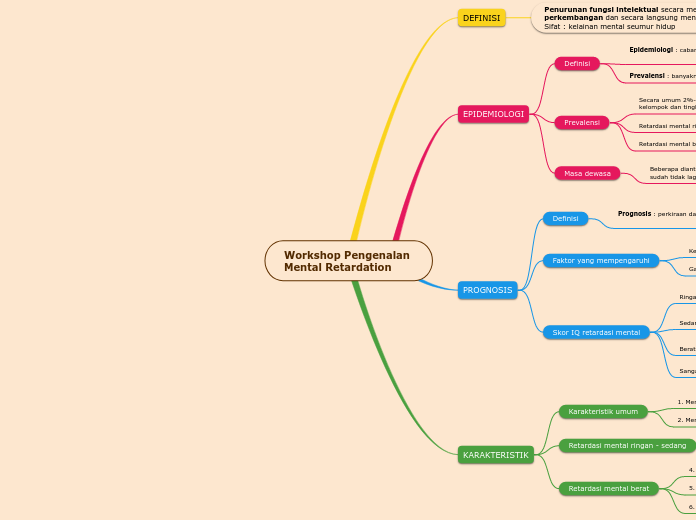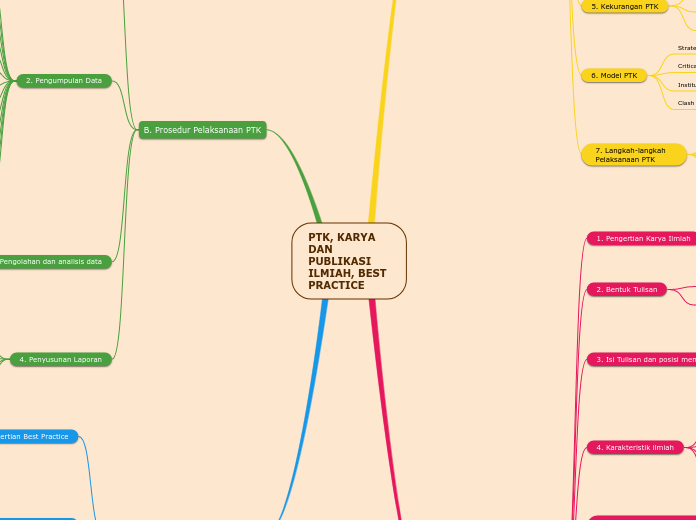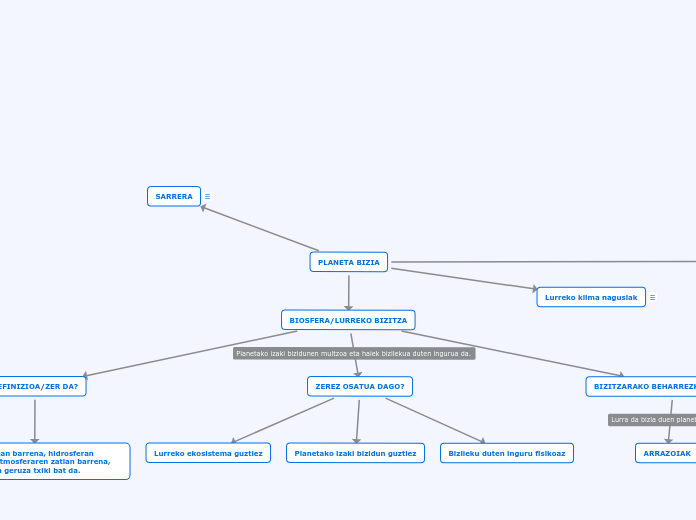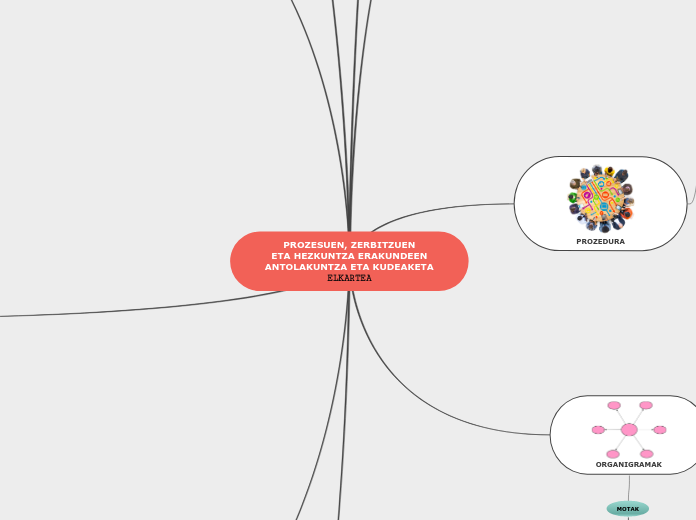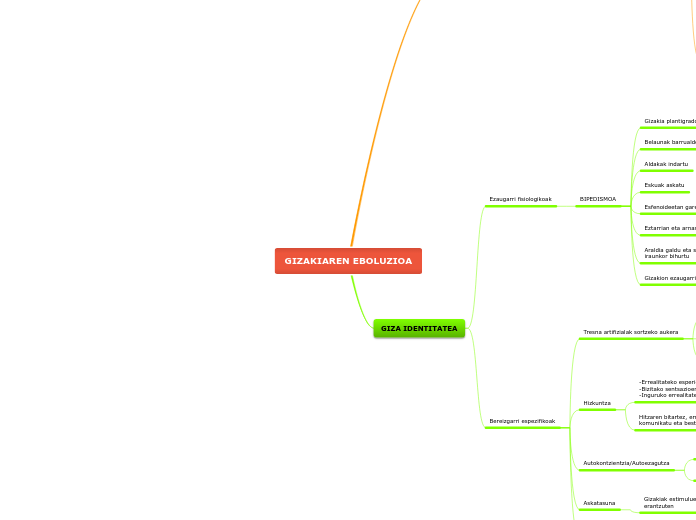Workshop Pengenalan
Mental Retardation
To name your story, you have to think about the overall message and what you want your audience to understand from the story. Also, make it relevant and easy to remember.
KARAKTERISTIK
Retardasi mental berat
6. Memunculkan perilaku merugikan diri sendiri
Membenturkan kepala, menggigit diri sendiri, dsb
5. Mengalami gerakan motorik stereotip
Mirip dengan yang terlihat pada anak autisme
4. Mengalami keterlambatan perkembangan motorik
Retardasi mental ringan - sedang
3. Menguasai pencapaian awal motorik kasar tepat waktu tetapi mengalami keterlambatan pada keterampilan motorik halus dan motorik kompleks
Karena ketidakmampuan anak memahami arahan verbal
Karakteristik umum
2. Mengalami keterlambatan bahasa
Contoh : keterlambatan bicara
1. Memiliki beberapa kelainan kongenital minor.
PROGNOSIS
The ending of a story is essential. We all know that if the ending is weak, what happened before loses its importance. So make it unpredictable, but fair. A resolved ending answers all the questions and ties up any loose threads from the plot.
Skor IQ retardasi mental
Sangat berat (profound)
IQ : <25
Berat (severe)
IQ : 25-39
Membaca untuk bertahan hidup (tanda berhenti / keluar), butuh bantuan dalam kehidupan sehari-hari sehingga harapan hidup dapat menurun secara signifikan.
Sedang (moderate)
IQ : 40-54
Dapat belajar dengan kecepatan 1/3 - 1/2, mencapai tingkat membaca kelas 1-3. Jarang ada yang menikah dan memiliki anak, jika ya kemungkinan membutuhkan dukungan dan perawatan kontinyu
Ringan (mild)
IQ : 55-69
Tanpa komorbid : dapat belajar dengan kecepatan normal, 1/2 - 2/3, dan mencapai tingkat membaca kelas 3-6. Pada masa remaja akhir dapat mandiri, menikah, dan memiliki anak.
Faktor yang mempengaruhi
This is the closure section of the story.
See examples of possible outcomes below:
- all problems have been solved
- it's clear how each one of your characters ends up
- your main character is transformed by the challenge
Gaya pengasuhan (pemberian kesempatan, pemupukan well-being, stabilitas)
Try answering these questions in order for you to come up with a closure:
- Have all problems been solved?
- Is it clear what happens with all your characters in the story?
- Has the challenged transformed your main character?
- How do the characters feel in the end?
Kecerdasan, faktor lingkungan & gangguan perilaku, psikiatrik, medis, sensorik.
Try answering these questions to come up with a closure:
- Have all the problems been solved?
- Is there a clear picture of what happens with each character in the story?
- Has the challenge transformed your main character?
- How do the characters feel in the end?
This is the moment when the main character surpasses the last obstacle and finally faces their greatest challenge.
The climax usually follows one of these patterns:
- realization
- resolution
- choice
Type in your answer.
Prognosis : perkiraan dari kemungkinan hasil akhir suatu gangguan penyakit baik dengan / tanpa pengobatan.
Mudah dideteksi pada anak dengan sindrom genetik
Susah dideteksi pada anak usia dini
EPIDEMIOLOGI
The middle of the story is where you add layers of complications that will lead to the end. Reveal more about the character's journey. Did their personality go through changes? How did they overcome the challenges? And as you build up the story’s central conflict, make it more personal to that character. Also, from the middle act, you have to lead into the final act.
Masa dewasa
Beberapa diantaranya ketika dewasa diidetifikasikan sudah tidak lagi memiliki keterbelakangan mental
Saat dewasa, tuntutan kemampuan akademis menurun, sehingga lebih condong ke kegiatan praktik yang bergantung pada kemampuan adaptasi, sehingga berbaur didalam dan bersama dengan orang lain dan keterbelakangan itu tampak lebur.
Prevalensi
Retardasi mental berat : 0,4% - 0,5%
Retardasi mental ringan : 85% dari seluruh kasus
Secara umum 2%-3%. Sedangkan untuk angka aktualnya bervariasi, tergantung pada penelitian, metode penentuan, usia kelompok dan tingkat gangguan.
Definisi
Each story has a main character and that character usually needs to solve a problem or challenge. The character's challenge is the one that creates tension throughout the story.
Prevalensi : banyaknya populasi yang memiliki karakteristik tertentu
Type in any other challenges which other characters in the story need to face.
Epidemiologi : cabang ilmu yang mempelajari dan menganalisis penyebaran kondisi kesehatan dan penyakit pada populasi tertentu.
In most stories, there are 3 challenges. The number 3 is a mystical number symbolizing completeness. Try to come up with interesting challenges with which your character needs to struggle.
See a few examples below:
- turns into a werewolf at night
- is sent back in time
DEFINISI
In the beginning of the story (or the exposition), you will need to introduce the setting and characters. You might also want to introduce the main conflict. This part of the story is important because it gives the reader necessary background information and maybe even a first insight into a character’s personality.
Penurunan fungsi intelektual secara menyeluruh yang terjadi pada masa perkembangan dan secara langsung menyebabkan gangguan adaptasi sosial.
Sifat : kelainan mental seumur hidup
The setting (time & place) of a story can change throughout the plot.
